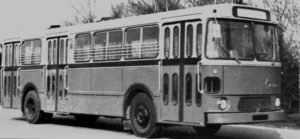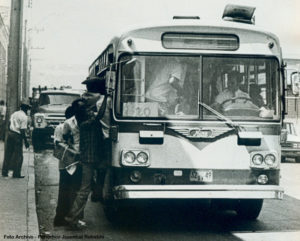The name of Guagua is attributed to the Cuban Esteban Pichardo (1836) who was the first to register it, according to Corominas. On the other hand, this author in his Etymological Critical Dictionary does not give a date for the documentation of the ‘bus’, although for him the term “is Cuban of course”, and he thinks that it can be an adaptation of the English wagon, ‘carriage’. The Americans, he informs us, called the military transport carriages and a medium-sized car used for the free transportation of people.
Maybe we should start by saying that the word guagua is used in the expression of guagua and as a noun, equivalent in this case to bus. The expression of guagua, ‘de balde’, is older and is recorded in America and Spain in the nineteenth century.
The word “guagua” which for Cubans means bus comes from the English Wa & Wa Co. Inc. (Washington, Walton, and Company Incorporated) which was the first US factory to export buses to the island. The logo of Wa & Wa Co., Inc. was a blue and red white hare, colors of the American flag, and featured prominently on the front, bottom and sides of all its buses.
Seen this, it is probable that, after the war for the independence of Cuba (1898), the immediate American occupation and the subsequent economic dependence, such vehicles were in use in the Caribbean island.
And speaking of children, buses and guaguas we will say that during the colonial period the Spanish government of Peru, ordered that in public shows and transportation children under six years would be admitted without paying anything, free! Hence the popular phrase “travel by bus” that amounted to free travel. During this time, civil and military works were carried out in the Vedado area in Havana.
The work was delayed a lot because the workers had to come and go on foot, since they earned little, and the official order was given that the workers of those works would not be charged passage. The owners put the cry in the sky. But the officer who had recently arrived from Peru and was at the head of the works quickly convinced them: “Rediez !, he ordered, this is a military defense and you have the obligation to help the government by taking the workers” guagua “, they heard well,” de guagua! “. Soon the Habaneros and all of Cuba extended that name to all passenger transport.
As for the Canaries, bus ‘bus’ does not register in vocabularies of the first two decades of the twentieth century. J. Reyes (1918), for example, who registers for Tenerife the expression of a guagua, does not register a guagua as a bus equivalent term. Later, Luis and Agustín Millares, who do in the Lexicon of Gran Canaria (1924) and How Canaries Speak (1932), speak of the American origin of the term. According to them, the buses were then “the omnibus, today automobiles, that exploit the transport service between the two extreme points of the population: the Puerto de la Luz and the San José neighborhood”.
In Tenerife, according to testimony from older people, still in the early years of the 1940s the garden voice was used to designate the public transport vehicle, and it was during those years that it spread quickly, starting in the capital, voice guagua instead of bus, term that had never been used, but as a gardener.
So, taking into account the above and, above all, that the first lexicographers who register guagua speak of their American origin, it seems more logical to think that said voice came from Cuba to the Canary Islands, as another element of luggage that, his return, brought our emigrants.
DE DONDE VIENE LA PALABRA “GUAGUA” USADA EN EL TRANSPORTE CUBANO ?.
El nombre de Guagua se le atribuye al cubano Esteban Pichardo (1836) quien fue el primero en registrarla, según Corominas. En cambio, este autor en su Diccionario Crítico Etimológico no da fecha para la documentación de guagua ‘autobús’, aunque para él dicho término “es cubano desde luego”, y opina que puede ser adaptación del inglés waggon, ‘carruaje’. Los americanos, según nos informa, denominaban así los carruajes de transporte militar y un automóvil mediano empleado para el transporte gratuito de personas.
Tal vez habría que empezar diciendo que la palabra guagua se usa en la expresión de guagua y como sustantivo, equivalente en este caso a autobús. La expresión de guagua, ‘de balde’, es más antigua y se registra en América y España en el siglo XIX.
La palabra “guagua” que para los cubanos significa autobús viene del inglés Wa & Wa Co. Inc. (Washington, Walton, and Company Incorporated) que fue la primera fábrica estadounidense en exportar autobuses a la isla. El logo de Wa & Wa Co., Inc. era una liebre blanca azul y roja, colores de la bandera norteamericana, y figuraba prominentemente en el frente, fondo y costados de todos sus autobuses.
Visto esto, es probable que, después de la guerra por la independencia de Cuba (1898), la inmediata ocupación americana y la posterior dependencia económica, en la isla antillana estuvieran en uso dicho tipo de vehículos.
Y hablando de niños, ómnibus y guaguas le diremos que durante la época colonial el gobierno español del Perú, ordenó que en los espectáculos y transporte públicos los niños menores de seis años serían admitidos sin pagar nada, gratis! De ahí surgió la frase popular “viajar de guagua” que equivalía a viajar gratis. Durante esa época se realizaban en La Habana obras civiles y militares en la zona del Vedado.
Los trabajos se demoraban mucho porque los trabajadores tenían que ir y venir a pie, ya que ganaban poco, y se dio la orden oficial que los trabajadores de esas obrar no se les cobrara pasaje. Los dueños pusieron el grito en el cielo. Pero el oficial que había llegado hacia poco del Perú y estaba al frente de las obras los convenció rápidamente: “¡Rediez!, ordenó, esta es una obra militar de defensa y ustedes tienen la obligación de ayudar al gobierno llevando a los trabajadores “de guagua”, oyeron bien, “de guagua!”. Pronto los habaneros y toda Cuba hizo extensiva esa denominación a todo transporte de pasajero
En cuanto a Canarias, guagua ‘autobús’ no se registra en vocabularios de las dos primeras décadas del siglo XX. J. Reyes (1918), por ejemplo, que registra para Tenerife la expresión de guagua, no registra guagua como término equivalente a autobús. Más tarde, Luis y Agustín Millares, que sí lo hacen en Léxico de Gran Canaria (1924) y Cómo hablan los canarios (1932), hablan del origen americano del término. Según ellos, las guaguas eran entonces “los ómnibus, hoy automóviles, que explotan el servicio de transportes entre los dos puntos extremos de la población: el Puerto de la Luz y el barrio de San José”.
En Tenerife, según testimonio de personas mayores, todavía en los primeros años de la década de los cuarenta se empleaba la voz jardinera para designar al vehículo de transporte público, y fue por esos años cuando se extendió rápidamente, a partir de la capital, la voz guagua en lugar no de autobús, término que nunca se había usado, sino de jardinera.
Así, pues, teniendo en cuenta lo anterior y, sobre todo, que los primeros lexicógrafos que registran guagua hablan de su origen americano, parece más lógico pensar que dicha voz haya venido de Cuba a Canarias, como un elemento más del equipaje que, a su regreso, traían nuestros emigrantes.
Agencies/Various/Internet Photos/Arnoldo Varona/TheCubanHistory.com
THE CUBAN HISTORY, HOLLYWOOD.










